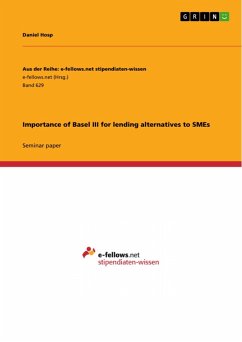Seminar paper from the year 2012 in the subject Business economics - Investment and Finance, grade: 1, University of Innsbruck, course: Aktuelle Themen in Banking and Finance, language: English, abstract: Basel III is currently on everyone's lips. Some weeks before the introduction of the first requirements it is still not fully clear how and which parts of it will be implemented. Several studies about the impact of Basel III on bank loan availability for small and medium sized companies (SMEs ) do exist (e.g. McKinsey (2010)) which have shown that the introduction of those new regulatory requirements hamper the access for SMEs to sufficient sources of funding. This raises the question if these restrictions for bank lending can be substituted by some alternative funding source or if the availability of external finance to SMEs will be constrained under Basel III. This seminar paper focuses on the lending alternatives apart from bank loans and the possibility of gathering additional equity capital. This is basically the so called asset based finance. Thereby the paper concentrates on European SMEs as long as their conditions are quite similar to those of Austrian SMEs and the introduction of Basel III can be expected to be most strict for European financial institution and thus may hit those SMEs the most. Before starting with the explanation of different lending alternatives the importance of SMEs for the global economy should be pointed out. The importance is especially present in Europe. SMEs account for two third of the total employment in the EU-27 area and they generated more economic growth from 2002 to 2008 than large firms did (Oxford Economics, 2011). Moreover they represent 99% of all businesses that exist in Europe (European Commission, 2005). So SMEs are the main driver of economic growth, employment and wealth in Europe. Apart from that each single SME does not have a systematic risk and they were also not responsible for the current financial crisis. Thus SMEs should generally be supported to sustain growth and employment. Nevertheless the rules of Basel III may have highly negative influences on their financing possibilities which moreover has a negative effect on the real economy...
Dieser Download kann aus rechtlichen Gründen nur mit Rechnungsadresse in A, B, BG, CY, CZ, D, DK, EW, E, FIN, F, GR, HR, H, IRL, I, LT, L, LR, M, NL, PL, P, R, S, SLO, SK ausgeliefert werden.









